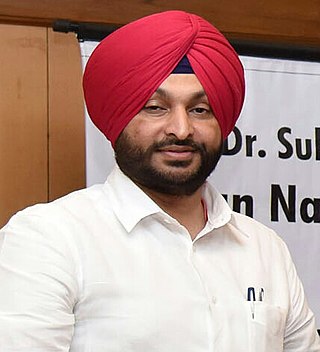
The Lok Sabha, constitutionally the House of the People, is the lower house of India's bicameral Parliament, with the upper house being the Rajya Sabha. Members of the Lok Sabha are elected by an adult universal suffrage and a first-past-the-post system to represent their respective constituencies, and they hold their seats for five years or until the body is dissolved by the President on the advice of the council of ministers. The house meets in the Lok Sabha Chambers of the Parliament House, New Delhi.

The Parliament of India is the supreme legislative body of the Republic of India. It is a bicameral legislature composed of the Rajya Sabha and the Lok Sabha. The President of India, in their role as head of the legislature, has full powers to summon and prorogue either house of Parliament or to dissolve the Lok Sabha, but they can exercise these powers only upon the advice of the Prime Minister and their Union Council of Ministers.
The Comptroller and Auditor General of India is the supreme audit institution of India, established under Article 148 of the Constitution of India. They are empowered to audit all receipts and expenditure of the Government of India and the State Governments, including those of autonomous bodies and corporations substantially financed by the government. The CAG is also the statutory auditor of Government-owned corporations and conducts supplementary audit of government companies in which the government has an equity share of at least 51 percent or subsidiary companies of existing government companies. The CAG is also the statutory auditor of the Lokpal.

Ramesh Bais is an Indian politician who currently serving as the 23rd Governor of Maharashtra since 2023. Bais also served as the Governor of Jharkhand from 2021 to 2023 and the Governor of Tripura from 2019 to 2021. He is a member of the Bharatiya Janata Party and has served as Union Minister of State for Environment and Forests in the government of Atal Bihari Vajpayee. Bais has been elected seven times to the Lok Sabha, the lower house of the Indian Parliament, representing the Raipur constituency, including serving as a member of the 9th Lok Sabha (1989) and 11th to 16th Lok Sabha (1996-2019).

Adhir Ranjan Chowdhury is an Indian politician serving as the leader of the Indian National Congress in the 17th Lok Sabha since 2021 and from 2019 to 2021 and the Member of Parliament from Berhampore since 1999. He is also the current president of West Bengal Pradesh Congress Committee following the demise of Somendra Nath Mitra since 2020 and from 2014 to 2018, Chairperson of Public Accounts Committee since 2019, Minister of State of Railways from 2012 to 2014 and the member of the West Bengal Legislative Assembly from 1996 to 1999.

The Oil and Natural Gas Corporation Limited (ONGC) is an Indian central public sector undertaking under the ownership of Ministry of Petroleum and Natural Gas, Government of India. The company is headquartered in New Delhi. ONGC was founded on 14 August 1956 by the Government of India. It is the largest government-owned-oil and gas explorer and producer in the country and produces around 70 percent of India's domestic production of crude oil and around 84 percent of natural gas. In November 2010, the Government of India conferred the Maharatna status to ONGC.
The Public Accounts Committee (PAC) is a committee of selected members of parliament, constituted by the Parliament of India, for the purpose of auditing the revenue and the expenditure of the Government of India. They check that parliament exercises over the executive stems from the basic principle that parliament embodies the will of the people. This committee along with the Estimates committee (EC) and Committee on Public Undertakings (COPU) are the three financial standing committees of the Parliament of India.
In the Indian Parliament, a Standing committee is a committee consisting of Members of Parliament or MPs . It is a permanent and regular committee which is constituted from time to time according to the provisions of an Act of Parliament or Rules of Procedure and Conduct of Business. The work done by the Indian Parliament is not only voluminous but also of a complex nature, hence a great deal of its work is carried out in these Parliamentary committees.

The Lokpal and Lokayuktas Act, 2013, commonly known as The Lokpal Act, is an anti-corruption Act of Indian Parliament in India which "seeks to provide for the establishment of the institution of Lokpal to inquire into allegations of corruption against certain important public functionaries including the Prime Minister, cabinet ministers, members of parliament, Group A officials of the Central Government and for matters connecting them".

Members of the 16th Lok Sabha were elected during the 2014 Indian general election. The elections were conducted in 9 phases from 7 April 2014 to 12 May 2014 by the Election Commission of India. The results of the election were declared on 16 May 2014.

Ravneet Singh Bittu is an Indian politician. He previously served as the leader of Indian National Congress in Lok Sabha from 11 March 2021 to 18 July 2021. Bittu was elected to the Lok Sabha, lower house of the Parliament of India from Ludhiana and earlier from Anandpur Sahib. He won the 2009, 2014 and 2019 Indian general election being an Indian National Congress candidate. He is the grandson of former Punjab Chief Minister Beant Singh.
Public Sector Undertakings (PSU) or Public Sector Enterprises (PSE) in India are government-owned enterprises in which 51 percent or more share capital is held by the Government of India or state governments. Depending on the level of government ownership, they can be broadly categorised as Central PSUs or State PSUs. These entities include government companies, statutory corporations, banking institutions, and departmentally run companies. PSUs are officially classified into three categories, which are Central Public Sector Enterprises (CPSE) and Public Sector Banks (PSB) owned by the central government or other CPSEs/PSBs, and State Level Public Enterprises (SLPE) owned by state governments or other SLPEs. CPSE is further classified into Strategic Sector and Non-Strategic Sector. Depending on their financial performance and progress, CPSEs are granted the status of Maharatna, Navaratna, and Miniratna.
'One Nation, One Election' is a proposal under consideration by the Government of India to synchronise elections for the Lok Sabha and all state assemblies. It intends to hold these elections simultaneously, either on a single day or within a specific time frame.
The Estimates Committee (India) is a committee of selected members of parliament, constituted by the Parliament of India (the Lok Sabha), for the purpose of scrutinising the functioning of government ministries and departments in terms of expenditure and utilisation of funds. It also suggests alternative policies in order to bring about efficiency and economy in administration. It also examines whether the finances are laid out within the limits of the policy implied in the estimates and also to suggest the form in which the estimates shall be presented to Parliament. This committee along with the Public Accounts committee(PAC) and Committee on Public Undertakings (COPU) are the three financial standing committees of the Parliament of India.
The Parliamentary Standing Committee on Defence (SCOD) is a department related standing committee (DRSC) of selected members of parliament, constituted by the Parliament of India, for the purpose of legislative oversight of the defence policies and decision making of the Ministry of Defence (MOD). It is one of the 24 DRSCs that have been mandated with the onerous task of ministry specific oversight.
The Parliamentary Standing Committee on Finance (SCOF) is a department related standing committee (DRSC) constituted by the Parliament of India comprising selected members of parliament for the purpose of legislative oversight on the policies and decision making of the following four ministries:
- Ministry of Finance (MoF)
- Ministry of Corporate Affairs
- Ministry of Statistics and Programme Implementation
- NITI Aayog
The Parliamentary Standing Committee on Home Affairs (SCOHA) is a department related standing committee (DRSC) of selected members of parliament, constituted by the Parliament of India, for the purpose of legislative oversight of the domestic policy, internal security and decision making of the Ministry of Home Affairs. It is one of the 24 DRSCs that have been mandated with the onerous task of ministry specific oversight.
The Parliamentary Standing Committee on External Affairs is a department related standing committee (DRSC) of selected members of parliament, constituted by the Parliament of India, for the purpose of legislative oversight of the foreign policy, and decision making of the Ministry of External Affairs. It is one of the 24 DRSCs that have been mandated with the task of ministry specific oversight.

Punjab Assembly Committee on Public Undertakings of Punjab Legislative Assembly is constituted annually for a one year period from among the members of the Assembly.







